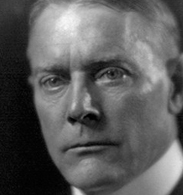As a U.S. Senator, Albert J. Beveridge was known as a brilliant orator and leading intellectual in the Progressive Movement. As a historian, his biography of Supreme Court Chief Justice John Marshall won him the Pulitzer Prize.
Early Life
Born in 1862 in Ohio, Beveridge graduated from Indiana Asbury University (now DePauw University) and was later admitted to the bar. He gained notoriety for his public speaking skills, later using them to campaign for various public officials, including Presidential candidate James G. Blaine.
Political Career
In 1899, Beveridge was elected as a Republican Senator from Indiana and held the seat until 1911. A staunch imperialist, he argued in favor of the annexation of the Philippines and called for the construction of a new navy. He also championed progressive reforms, including child labor legislation. In response to the publication of Upton Sinclair’s publication of The Jungle, he introduced the Federal Meat Inspection Act of 1906.
Hays later joined the Progressive Party and was the keynote speaker at the party’s convention that nominated Roosevelt for U.S. President in 1912. However, he was never again elected to public office after losing elections for Indiana governor and U.S. Senate.
Once out of politics, Beveridge devoted himself to writing. The Life of John Marshall won Beveridge a Pulitzer Prize for Biography or Autobiography. He was writing a 4-volume biography of Abraham Lincoln at time of his death, which was later published posthumously.









